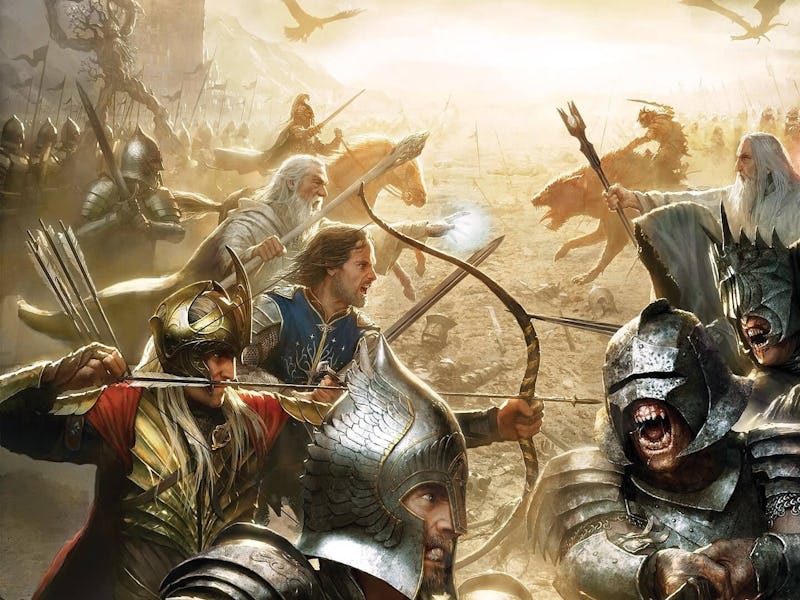15 Years Ago, The Lord of the Rings Squandered the Perfect Video Game Idea
Unrealized potential.

Licensed video games have always been a mixed bag, but a few have managed to stand out. Lord of the Rings is one of those franchises that just makes sense in games: an expansive fantasy saga brimming with potential. Peter Jackson’s films gave the franchise a fantastic visual language to use, especially when it came to the epic battles it represented so well. With that in mind, a video game focused on capturing those unforgettable battles is an incredible idea and something that, by all accounts, should have worked. Unfortunately, 15 years ago, Lord of the Rings: Conquest squandered the perfect chance to make an unforgettable experience.
The biggest sin of Lord of the Rings: Conquest is that it’s overwhelming mediocre, an uninspired experience that isn’t objectively broken but simply doesn’t do anything with the fantastic source material. It’s especially frustrating because Conquest was developed by the now-defunct Pandemic Studios, the developer behind the beloved Star Wars Battlefront games. This was meant to be the Lord of the Rings version of Battlefront, which again, is a phenomenal idea on paper.
Unlike Battlefront, Conquest felt far too rushed and unpolished for its own good.
Most of Conquest’s problems boil down to a lack of polish, with imprecise controls and poorly thought-out classes that simply don’t feel balanced. Just like in the Battlefront games, in Conquest, you take control of normal soldiers on the battlefield with chances to play as iconic “Heroes” scattered throughout levels.
Conquest has four classes to choose from, on both the good and evil sides: Warrior, Archer, Scout, and Mage. That’s a small selection in comparison to Battlefront, but it also feels like Pandemic just didn’t have time to design these classes to play well off each other. Each one works fine, in theory, but in multiplayer, you start to see cracks form.
The Scout’s sneaking and invisibility skills give it a massive advantage, especially when there are dozens of characters on-screen. Meanwhile, the Warrior's damaging melee attacks are wildly imprecise and sometimes feel like a game of chance whether you can hit an enemy or not. Functionally, everything in Conquest works, but it all just feels a bit “off.” Coupled with this is a lackluster presentation, even by 2009’s standards, and a severe lack of content.
Despite its mechanical issues, Conquest manages to nail map design and the scale of the series’ iconic battles.
The one area Conquest nails is its map design. It’s admittedly very cool to wander around iconic locations like Minas Tirith as dozens of soldiers battle around you. Unfortunately, that impression wears off quickly as Conquest’s mundane gameplay starts to rear its head.
It’s easy to harp on and on about the problems with Conquest, but the real crux of what made it so disappointing is how easily you can see the foundations of something great. There are some extraordinary moments interspersed among the monotony, like seeing a pack of minuscule Hobbits try and take on the fearsome Balrog. Again, the locations and maps are done incredibly well, and having a more solid gameplay foundation alongside that could have turned Conquest into something special, just like Battlefront.
Further, the campaigns are just recreations of the films and their battles. By comparison, Battlefront 2 had a fantastic campaign with an original story that followed a Clone legion called the 501st detailing their path through different years of Star Wars lore, namely the Clone Wars and the founding of the Empire. Conquest could have had something similar that helped flesh out the deep pockets of Lord of the Rings’ world.
Conquest’s campaigns feel too simplistic and represent a seriously missed opportunity.
The timeline of Pandemic Studios might give us a clue as to what went wrong with Conquest. In 2007, the studio was sold to EA, and Conquest was released roughly two years later in January 2009. Sadly, Pandemic was completely shut down months later in November. Clearly, the studio was under pressure, and Conquest likely had a very tight budget and timeline. This was also around the time EA started emphasizing multiplayer over single-player experiences, a change seen in the design of Conquest.
It’s fascinating to think about the game we could have gotten if Pandemic hadn’t been under such pressure and time constraints. At the moment, it’s a relic of the past, but the idea at its core is still solid. Later Lord of the Rings games, like Shadow of War, have embraced massive battles and sieges, and did a good job of it. In 2022, a group of fans even made a concept demo of a Conquest remake, showing what a modern take on the concept could look like. With the series coming back through Rings of Power and a planned War of the Rohirrim anime, maybe it’s time to take another crack at a Conquest-like game.
This article was originally published on